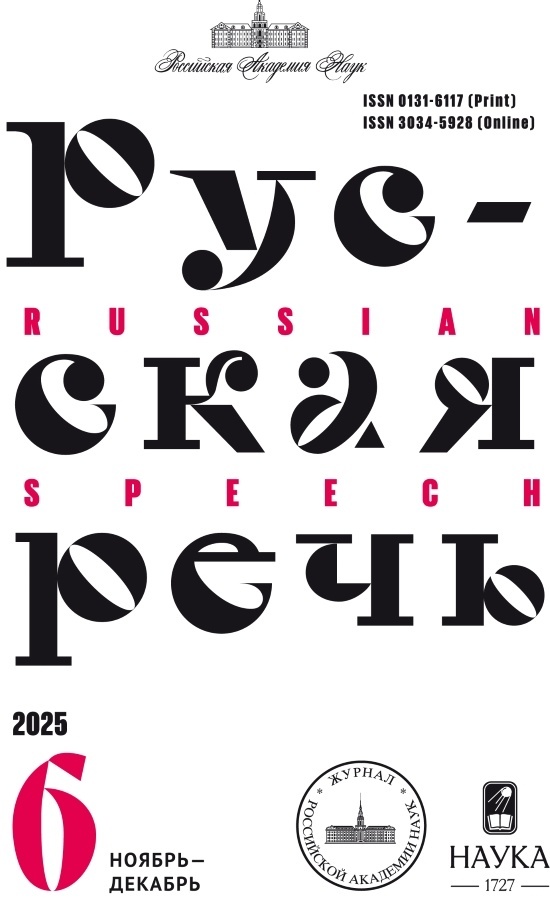Eto Mne Otklikayetsya: New Verb Control?
- Authors: Melnikova E.M.1
-
Affiliations:
- Yaroslavl State Pedagogical University named after K. D. Ushinsky
- Issue: No 6 (2025)
- Pages: 54-66
- Section: Issues of Modern Russian Language
- URL: https://modernonco.orscience.ru/0131-6117/article/view/696183
- DOI: https://doi.org/10.31857/S0131611725060049
- ID: 696183
Abstract
The article examines a new construction with the verb otklikat'sya, governing the dative case, which is becoming widespread in modern speech. This construction is presented mainly in colloquial speech and is not yet recorded in standard dictionaries. It is shown that the new control illustrates the concept of syntactic homonymy. The dative case in the new phrase expresses the semantic role of the experiencer - the subject of perception, in contrast to the traditional construction with the dative of the addressee. The complication of the semantic structure of such a phrase is described: the subject of the state, expressed in the dative case, combines the semantics of the "carrier of the state" and the "object" of this state (the one to whom it is directed). In this regard, the combinability possibilities of the verb otklikat'sya are expanding: the role of the subject in statements with such a construction can be played by abstract nouns, denoting what is to be perceived. It is noted that a change in the semantic role of the dative case with the verb otklikat'sya leads to a change in the nature of control: from a weakly controlled form, the dative case becomes a strongly controlled case form, used to express the meaning of the subject of perception. It is indicated that the orientation towards the subjective principle in such combinations is supported by the ability of the verb otklikat'sya to control the prepositional case with the preposition v and the genitive case with the preposition u, which indirectly designates the subject of perception through an appeal to his inner world. The author suggests that the emergence of a new construction is due to the action of the analogy mechanism: the meaning of the verb otklikat'sya is formed under the influence of the meaning and syntactic "behavior" of the verb nravit'sya. Thus, we can trace the development of a new meaning for the verb otklikat'sya (as well as for its synonym otzyvat'sya), including the semes "response action", "emotional response", which are absent in the meaning of the verb nravit'sya.
About the authors
E. M. Melnikova
Yaroslavl State Pedagogical University named after K. D. Ushinsky
Author for correspondence.
Email: em09@mail.ru
Yaroslavl
References
- Akimova G. N. Novoye v sintaksise sovremennogo russkogo yazyka [New in the syntax of the modern Russian language]. Moscow, Vysshaya Shkola Publ., 1990. 168 p.
- Gerd A. S. (ed.). Bol'shoi akademicheskii slovar' russkogo yazyka [Large academic dictionary of the Russian language]. T. 14. Moscow, St. Petersburg, Nauka Publ., 2010. 655 p.
- Glovinskaya M. Ya. [Active processes in grammar]. Russkii yazyk kontsa XX stoletiya (1985-1995) [Russian language at the end of the XX century (1985-1995)]. Moscow, Yazyki Slavyanskoi Kul'tury Publ., 2000, pp. 237-304. (In Russ.)
- Krysin L. P. [About one type of violation of syntactic norms]. Sovremennyi russkii yazyk: Sistema - norma - uzus [Modern Russian language: System - norm - usage]. Moscow, Yazyki Slavyanskikh Kul'tur Publ., 2010, pp. 200-204. (In Russ.)
- Kustova G. I. [Dative case]. Russkaya korpusnaya grammatika [Russian corpus grammar]. 2011. Available at: http://rusgram.ru/new/chapter/nounpar/dative_case/#label_toc341197705 (accessed 28.12.2024).
- Kuznetsov S. A. (ed.). Bol'shoi tolkovyi slovar' russkogo yazyka [Large explanatory dictionary of the Russian language]. St. Petersburg, Norint Publ., 2000. 1536 p.
- Morkovkin V. V., Bogachova G. F., Lutskaya N. M. Bol'shoi universal'nyi slovar' russkogo yazyka [Large universal dictionary of the Russian language]. Moscow, Slovari XXI Veka Publ.; AST-PRESS SHKOLA Publ., 2016. 1456 p.
- Shvedova N. Yu. Aktivnyye protsessy v sovremennom russkom sintaksise (slovosochetaniye) [Active processes in modern Russian syntax (phrase)]. Moscow, Prosveshcheniye Publ., 1966. 156 p.
- Shvedova N. Yu. (ch. ed.). Russkaya grammatika: nauchnye trudy [Russian grammar: scientific works]. In 2 volumes. Vol. 2. Reprint edition 1980. Moscow, Nauka Publ., 2005. 712 p.
- Valgina N. S. Aktivnye protsessy v sovremennom russkom yazyke [Active processes in modern Russian]. Moscow, Logos Publ., 2003. 304 p.
- Vinogradov V. V. (ch. ed.). Grammatika russkogo yazyka [Grammar of the Russian language]. Vol. II. Syntax. Part 1. Moscow, Publishing House of the USSR Academy of Sciences, 1954. 703 p.
- Vinogradov V. V., Shvedova N. Yu. (eds.). Ocherki po istoricheskoi grammatike russkogo literaturnogo yazyka XIX veka. Izmeneniya v sisteme slovosochetanii v russkom literaturnom yazyke XIX veka [Essays on the historical grammar of the Russian literary language of the XIX century. Changes in the system of phrases in the Russian literary language of the XIX century]. Moscow, Nauka Publ., 1964. 302 p.
- Zolotova G. A. Onipenko N. K. Sidorova M. Yu. Kommunikativnaya grammatika russkogo yazyka [Communicative grammar of the Russian language]. Moscow, Russian Academy of Sciences, Vinogradov Institute of the Russian Language Publ., 2004. 544 p.











